英国部分历史事件的英文解释
高中英语知识点归纳历史事件与制度

高中英语知识点归纳历史事件与制度高中英语知识点归纳:历史事件与制度英语学习中,了解一些历史事件与相关的制度是非常重要的。
这些历史事件和制度对于理解英语文化和语言的发展起到了重要的作用。
以下将对一些与历史事件和制度相关的英语知识点进行归纳。
一、美国历史事件1. The American Revolution(美国独立战争)- 1775年爆发,是美国追求独立的起点。
- 相关词汇:Declaration of Independence(独立宣言)、Founding Fathers(建国元勋)2. The Civil War(美国内战)- 1861年至1865年进行,是围绕奴隶制度展开的战争。
- 相关词汇:Abraham Lincoln(亚伯拉罕·林肯)、Emancipation Proclamation(解放黑奴宣言)3. The Great Depression(大萧条)- 1929年经济危机引发的全球经济恶化。
- 相关词汇:New Deal(新政)、Wall Street Crash(华尔街股市崩盘)二、英国历史事件1. The Magna Carta(《大宪章》)- 1215年签署,明确了国王权力受制于法律的原则。
- 相关词汇:Rule of Law(法治)、Constitutional Monarchy(君主立宪制)2. The Industrial Revolution(工业革命)- 18世纪末至19世纪初,英国工业的迅猛发展。
- 相关词汇:Steam Engine(蒸汽机)、Factory System(工厂体制)3. The British Empire(大英帝国)- 17世纪至20世纪,英国对世界各地的殖民地及其影响力的扩张。
- 相关词汇:Colonialism(殖民主义)、Commonwealth(英联邦)三、国际制度1. The United Nations(联合国)- 1945年成立,致力于国际和平与合作。
英国历史故事英文版
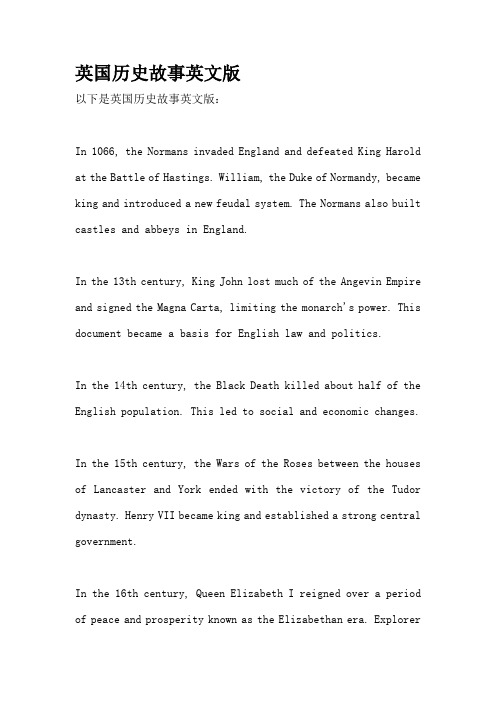
英国历史故事英文版以下是英国历史故事英文版:In 1066, the Normans invaded England and defeated King Harold at the Battle of Hastings. William, the Duke of Normandy, became king and introduced a new feudal system. The Normans also built castles and abbeys in England.In the 13th century, King John lost much of the Angevin Empire and signed the Magna Carta, limiting the monarch's power. This document became a basis for English law and politics.In the 14th century, the Black Death killed about half of the English population. This led to social and economic changes.In the 15th century, the Wars of the Roses between the houses of Lancaster and York ended with the victory of the Tudor dynasty. Henry VII became king and established a strong central government.In the 16th century, Queen Elizabeth I reigned over a period of peace and prosperity known as the Elizabethan era. ExplorerFrancis Drake circumnavigated the world in the Golden Hind.In the 17th century, King James I succeeded Elizabeth and established the Stuart dynasty. The English Civil War broke out in 1642 and ended with the execution of King Charles I in 1649. The monarchy was then abolished and replaced by a republican government known as the Commonwealth of England.希望这个故事能满足您的需求。
英国的古老历史和文化介绍英文
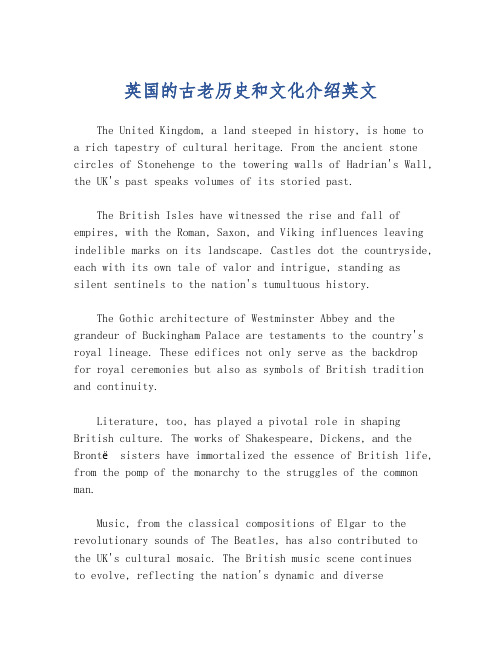
英国的古老历史和文化介绍英文The United Kingdom, a land steeped in history, is home to a rich tapestry of cultural heritage. From the ancient stone circles of Stonehenge to the towering walls of Hadrian's Wall, the UK's past speaks volumes of its storied past.The British Isles have witnessed the rise and fall of empires, with the Roman, Saxon, and Viking influences leaving indelible marks on its landscape. Castles dot the countryside, each with its own tale of valor and intrigue, standing assilent sentinels to the nation's tumultuous history.The Gothic architecture of Westminster Abbey and the grandeur of Buckingham Palace are testaments to the country's royal lineage. These edifices not only serve as the backdrop for royal ceremonies but also as symbols of British tradition and continuity.Literature, too, has played a pivotal role in shaping British culture. The works of Shakespeare, Dickens, and the Brontë sisters have immortalized the essence of British life, from the pomp of the monarchy to the struggles of the common man.Music, from the classical compositions of Elgar to the revolutionary sounds of The Beatles, has also contributed to the UK's cultural mosaic. The British music scene continuesto evolve, reflecting the nation's dynamic and diversesociety.The UK's cultural landscape is further enriched by its vibrant festivals and celebrations. From the pageantry of the Changing of the Guard to the revelry of Glastonbury, these events encapsulate the spirit of the British people and their love for tradition and innovation.In conclusion, the United Kingdom's history and culture are as complex and multifaceted as the people who call it home. Its ancient landmarks, royal traditions, literary treasures, and musical evolutions paint a picture of a nation that is both deeply rooted in its past and constantly looking towards the future.。
英语说明英国的历史作文

英语说明英国的历史作文Title: A Journey Through British History。
Introduction:The history of Britain is a tapestry woven with threads of conquests, cultural exchanges, and societal transformations. From the ancient Celts to the modern-day United Kingdom, the island nation has witnessed a saga of triumphs and tribulations. In this essay, we embark on a journey through the annals of British history, exploringits key epochs and pivotal moments that shaped its identity.1. Ancient Britain:Our voyage begins in ancient Britain, inhabited byCeltic tribes who thrived in the lush landscapes of the island. These early Britons left behind enigmatic monuments like Stonehenge, testaments to their ingenuity andspiritual beliefs. The Roman conquest in 43 AD introduced anew chapter, as Britain became a province of the vast Roman Empire. Roman influence left an indelible mark on British society, evident in infrastructure, governance, and culture.2. The Dark Ages:With the decline of the Roman Empire, Britain plunged into the tumultuous era known as the Dark Ages. Invading Anglo-Saxons and Vikings reshaped the political landscape, giving rise to the Anglo-Saxon kingdoms and the Danelaw. Amidst the chaos, Christianity took root, shaping both spiritual and political realms. The legendary figure ofKing Arthur emerged from this period, embodying the idealsof chivalry and unity.3. The Medieval Period:The Norman Conquest of 1066 brought William the Conqueror to the English throne, heralding the dawn of the medieval period. Feudalism dominated society, with knights swearing allegiance to their lords in exchange for land and protection. Magna Carta, signed in 1215, laid thegroundwork for constitutional governance and the rule of law. The Hundred Years' War and the Black Death cast shadows over this epoch, yet Britain emerged resilient, its identity forged in the crucible of adversity.4. The Tudor Dynasty:The Tudor dynasty ushered in an era of Renaissance and Reformation, transforming Britain's cultural and religious landscape. Henry VIII's break from the Catholic Church laid the foundation for the Church of England, marking a pivotal moment in British history. Elizabethan England flourished under the reign of Queen Elizabeth I, epitomizing the age of exploration, literature, and theatre.5. The Stuart Era:The Stuart era witnessed civil strife and political upheaval, culminating in the English Civil War and the execution of King Charles I. The Glorious Revolution of 1688 ushered in a constitutional monarchy, limiting the power of the monarchy and establishing the supremacy ofParliament. The Act of Union in 1707 united England and Scotland under a single parliament, laying the groundwork for the modern United Kingdom.6. The Industrial Revolution:The Industrial Revolution propelled Britain into a new age of innovation and economic prosperity. Steam engines, factories, and railways revolutionized manufacturing and transportation, transforming society and urban landscapes. The Victorian era, named after Queen Victoria, saw Britain emerge as a global superpower, its influence extending across continents through trade and imperialism.7. The Modern Era:The 20th century brought unprecedented challenges and transformations to Britain. World Wars I and II tested the nation's resilience and unity, shaping its role in global affairs. The decline of the British Empire and the emergence of the welfare state marked profound shifts in politics and society. Today, Britain stands as amulticultural society, embracing diversity and striving for social progress in an ever-changing world.Conclusion:From its ancient origins to the complexities of the modern era, British history is a testament to the resilience, adaptability, and diversity of its people. As we reflect on this journey through time, we recognize the enduring legacy of Britain's past, shaping its present and inspiring its future endeavors.。
British_History 1 英语国家概况 英国历史相关
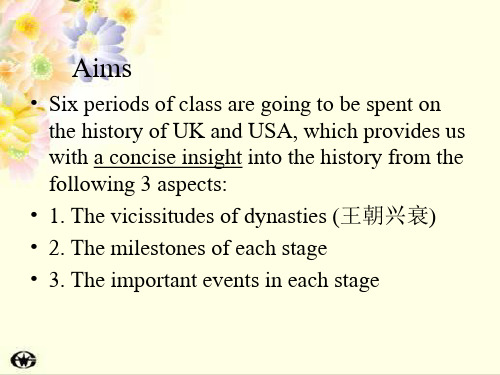
Stonehenge
It is the most famous prehistoric monument in Britain and is situated on Salisbury Plain in the county of Wiltshire. The Iberians began building Stonehenge about 5,000 years ago, dragging each
• In the ninth century they conquered and settled the extreme north and west of Scotland, and also some coastal regions of Ireland.
• Their conquest of England was halted when they were defeated by King Alfred of the Saxon kingdom of Wessex. This resulted in an agreement in 878 which divided England between Wessex in the south and west, and the “Danelaw” in the north and east.
Anglo-Saxon Heptarchy (七国时代)
• The seven principal kingdoms of Kent, Essex, Sussex, Wessex, East Anglia, Mercia and Northumbria have been given the name of Heptarchy, having occupied the lowland zones. – Jutes invasion: In 449, the Jutish chief became the king of Kent; – Anglo-Saxon Conquest: • Saxon : Essex, Sussex, Wessex; • Angles: East Anglia, Northumbria, Mercia ;
中英对照英国历史简介
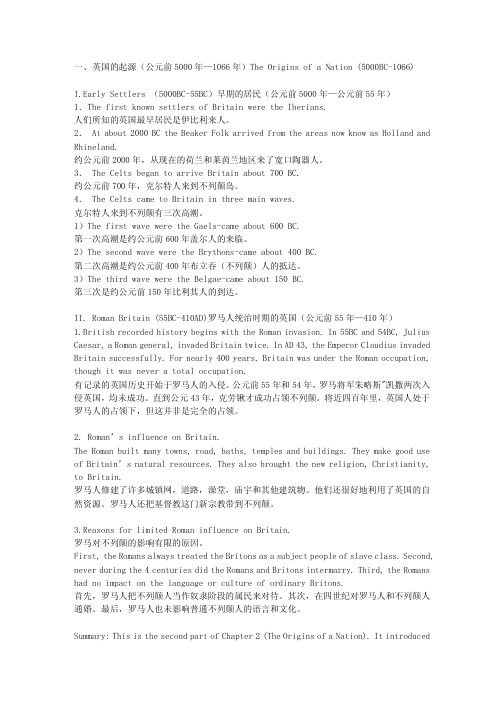
一、英国的起源�公元前5000年—1066年�T h e O r i g i n s o f a N a t i o n(5000B C-1066)I.E a r l y S e t t l e r s�5000B C-55B C�早期的居民�公元前5000年—公元前55年�1�T h e f i r s t k n o w n s e t t l e r s o f B r i t a i n w e r e t h e I b e r i a n s.人们所知的英国最早居民是伊比利来人。
2�A t a b o u t2000B C t h e B e a k e r F o l k a r r i v e d f r o m t h e a r e a s n o w k n o w a s H o l l a n d a n d R h i n e l a n d.约公元前2000年�从现在的荷兰和莱茵兰地区来了宽口陶器人。
3�T h e C e l t s b e g a n t o a r r i v e B r i t a i n a b o u t700B C.约公元前700年�克尔特人来到不列颠岛。
4�T h e C e l t s c a m e t o B r i t a i n i n t h r e e m a i n w a v e s.克尔特人来到不列颠有三次高潮。
1�T h e f i r s t w a v e w e r e t h e G a e l s-c a m e a b o u t600B C.第一次高潮是约公元前600年盖尔人的来临。
2�T h e s e c o n d w a v e w e r e t h e B r y t h o n s-c a m e a b o u t400B C.第二次高潮是约公元前400年布立吞�不列颠�人的抵达。
3�T h e t h i r d w a v e w e r e t h e B e l g a e-c a m e a b o u t150B C.第三次是约公元前150年比利其人的到达。
英国侵略史(英文)资料

•
古斯丁) with 40 missionaries
• Invasion time: from 597AD to the late 7th century
• Influence: Roman Christianity became the main British religion
• ④ Invader: Vikings from the Northern Europe, Norway and Denmark. • Domination time: 8th century to 1066AD • Domination area: the North and the East of the island.
A history of Britain is a history of invasion and being invaded
LOREM IPSUM DOLOR LOREM
Content
① Abstract ② The history about Britain as a victim of
invasion ③ The history about Britain as an invader
• ② Invader: Germanic • Domination time: the middle period of 5th century to the end of 7th century • Domination area: The Angles settled in East Anglia, the Midlands and the
The history about Britain as a victim of invasion
Chronology of Events
英国历史演变过程英语作文

英国历史演变过程英语作文The history of the United Kingdom is a tapestry wovenwith rich cultural threads and significant events. From its early beginnings as a land inhabited by various Celtic tribes, Britain has seen a multitude of transformations.The Roman conquest in the 1st century AD marked a pivotal moment, introducing new governance and infrastructure. The subsequent invasion by the Anglo-Saxons in the 5th century reshaped the cultural landscape, leading to the establishment of the English language.The Norman Conquest in 1066, led by William the Conqueror, was a defining event that consolidated the English monarchy and influenced the nation's legal and social systems. The Middle Ages saw the rise of powerful monarchs and the emergence of a distinct national identity.The Renaissance period brought about a rebirth of artsand sciences, with figures like William Shakespearecontributing to the cultural renaissance. The Elizabethan era was a time of great exploration and the expansion of theBritish Empire.The Industrial Revolution in the 18th and 19th centuries was a transformative period, with Britain leading the way in technological advancements and economic growth. This era also saw the rise of the working class and significant socialreforms.The 20th century was marked by two World Wars, which had profound effects on British society and its global standing. Post-war Britain experienced a period of reconstruction and the establishment of the National Health Service, reflecting a shift towards a more equitable society.Today, the United Kingdom continues to evolve, navigating its place in the European Union and the world. Its history is a testament to resilience and the ability to adapt to the changing tides of time.。
英国历史的英语介绍带翻译
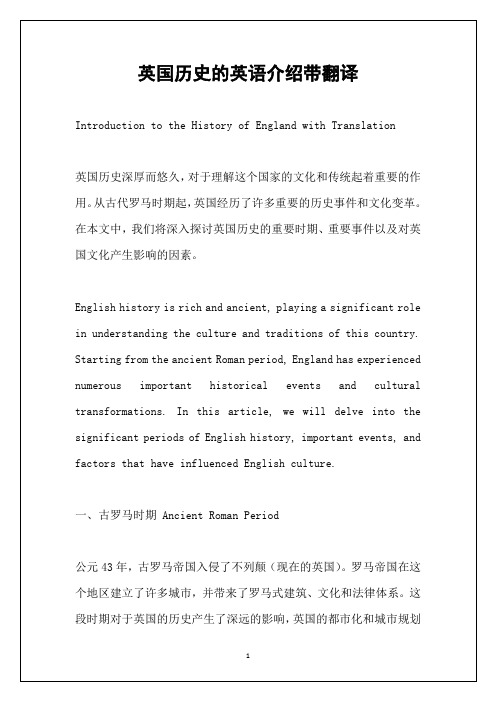
通过对英国历史的英语介绍,我们可以理解这个国家的文化和传统的形成过程。对于学习英国文化和了解世界历史的人来说,深入了解英国历史是非常有价值的。无论是古罗马时期、盎格鲁-撒克逊时期、诺曼底征服时期,还是宪法发展和工业革命,这些重要的时期和事件塑造了英国的现代社会和文化面貌。
二、盎格鲁-撒克逊时期 Anglo-Saxon Period
5世纪至11世纪是盎格鲁-撒克逊时期。在这一时期,来自日耳曼地区的盎格鲁-撒克逊人占领了不列颠,并建立了七主要王国。这段时期见证了英国基督教的传入,以及英语作为主要语言的形成。盎格鲁-撒克逊文化对英国文化产生了深远的影响,英国的传统节日和习俗中仍可以看到其痕迹。
五、工业革命 Industrial Revolution
18世纪的英国经历了工业革命,这次革命对英国和世界产生了深远的影响。领导着全球工业变革的英国通过发明和创新推动了工业化进程,从而带动了经济繁荣。工业革命改变了英国社会结构,也引发了许多社会问题。然而,这段时期同时也催生了现代科学、技术和制度的重大进步。
英语国家概况英国的历史起源(2)
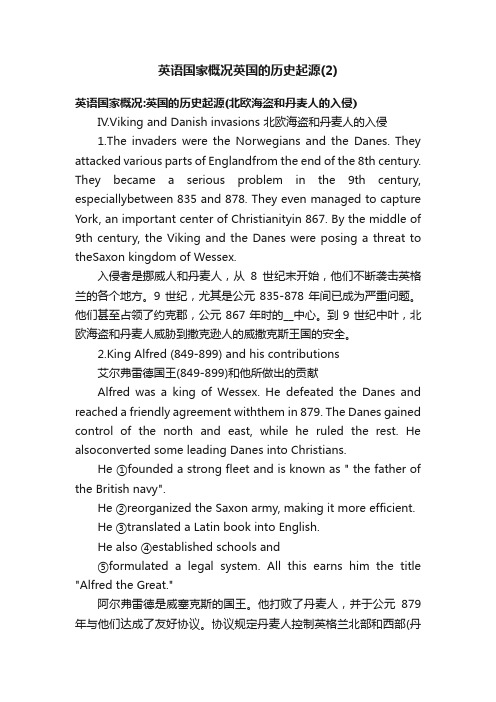
英语国家概况英国的历史起源(2)英语国家概况:英国的历史起源(北欧海盗和丹麦人的入侵) IV.Viking and Danish invasions 北欧海盗和丹麦人的入侵1.The invaders were the Norwegians and the Danes. They attacked various parts of Englandfrom the end of the 8th century. They became a serious problem in the 9th century, especiallybetween 835 and 878. They even managed to capture York, an important center of Christianityin 867. By the middle of 9th century, the Viking and the Danes were posing a threat to theSaxon kingdom of Wessex.入侵者是挪威人和丹麦人,从8世纪末开始,他们不断袭击英格兰的各个地方。
9世纪,尤其是公元835-878年间已成为严重问题。
他们甚至占领了约克郡,公元867年时的__中心。
到9世纪中叶,北欧海盗和丹麦人威胁到撒克逊人的威撒克斯王国的安全。
2.King Alfred (849-899) and his contributions艾尔弗雷德国王(849-899)和他所做出的贡献Alfred was a king of Wessex. He defeated the Danes and reached a friendly agreement withthem in 879. The Danes gained control of the north and east, while he ruled the rest. He alsoconverted some leading Danes into Christians.He ①founded a strong fleet and is known as " the father of the British navy".He ②reorganized the Saxon army, making it more efficient.He ③translated a Latin book into English.He also ④established schools and⑤formulated a legal system. All this earns him the title "Alfred the Great."阿尔弗雷德是威塞克斯的国王。
英国历史上的重大事件简介
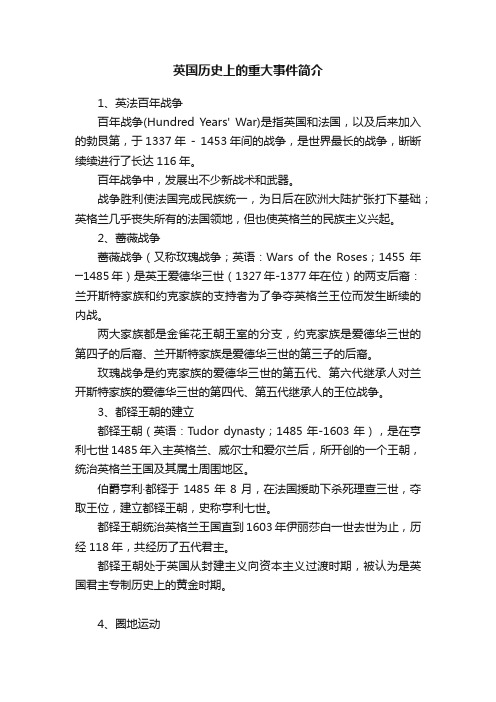
英国历史上的重大事件简介1、英法百年战争百年战争(Hundred Years' War)是指英国和法国,以及后来加入的勃艮第,于1337年- 1453年间的战争,是世界最长的战争,断断续续进行了长达116年。
百年战争中,发展出不少新战术和武器。
战争胜利使法国完成民族统一,为日后在欧洲大陆扩张打下基础;英格兰几乎丧失所有的法国领地,但也使英格兰的民族主义兴起。
2、蔷薇战争蔷薇战争(又称玫瑰战争;英语:Wars of the Roses;1455年─1485年)是英王爱德华三世(1327年-1377年在位)的两支后裔:兰开斯特家族和约克家族的支持者为了争夺英格兰王位而发生断续的内战。
两大家族都是金雀花王朝王室的分支,约克家族是爱德华三世的第四子的后裔、兰开斯特家族是爱德华三世的第三子的后裔。
玫瑰战争是约克家族的爱德华三世的第五代、第六代继承人对兰开斯特家族的爱德华三世的第四代、第五代继承人的王位战争。
3、都铎王朝的建立都铎王朝(英语:Tudor dynasty;1485年-1603年),是在亨利七世1485年入主英格兰、威尔士和爱尔兰后,所开创的一个王朝,统治英格兰王国及其属土周围地区。
伯爵亨利·都铎于1485年8月,在法国援助下杀死理查三世,夺取王位,建立都铎王朝,史称亨利七世。
都铎王朝统治英格兰王国直到1603年伊丽莎白一世去世为止,历经118年,共经历了五代君主。
都铎王朝处于英国从封建主义向资本主义过渡时期,被认为是英国君主专制历史上的黄金时期。
4、圈地运动在14、15世纪农奴制解体过程中,英国新兴的资产阶级和新贵族通过暴力把农民从土地上赶走,强占农民份地及公有地,剥夺农民的土地使用权和所有权,限制或取消原有的共同耕地权和畜牧权,把强占的土地圈占起来,变成私有的大牧场、大农场。
这就是英国历史上的“圈地运动”。
在欧洲,英国的圈地运动最为典型,规模也最大。
封建制度时期,英国就已存在大规模圈地运动。
英国历史作文英语介绍
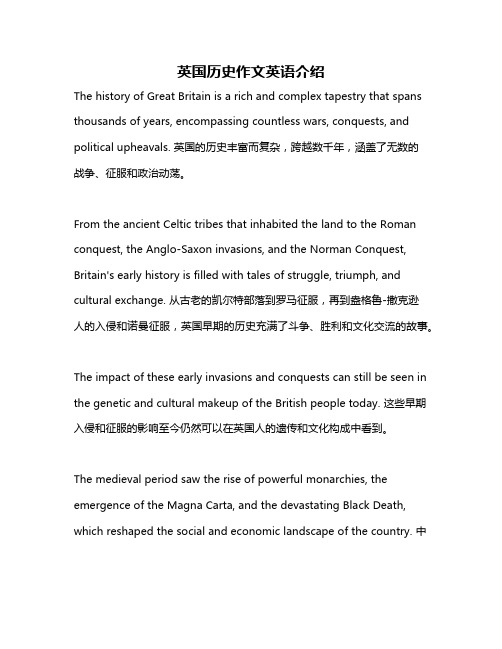
英国历史作文英语介绍The history of Great Britain is a rich and complex tapestry that spans thousands of years, encompassing countless wars, conquests, and political upheavals. 英国的历史丰富而复杂,跨越数千年,涵盖了无数的战争、征服和政治动荡。
From the ancient Celtic tribes that inhabited the land to the Roman conquest, the Anglo-Saxon invasions, and the Norman Conquest, Britain's early history is filled with tales of struggle, triumph, and cultural exchange. 从古老的凯尔特部落到罗马征服,再到盎格鲁-撒克逊人的入侵和诺曼征服,英国早期的历史充满了斗争、胜利和文化交流的故事。
The impact of these early invasions and conquests can still be seen in the genetic and cultural makeup of the British people today. 这些早期入侵和征服的影响至今仍然可以在英国人的遗传和文化构成中看到。
The medieval period saw the rise of powerful monarchies, the emergence of the Magna Carta, and the devastating Black Death, which reshaped the social and economic landscape of the country. 中世纪时期见证了强大君主制的崛起,《大宪章》的出现以及毁灭性的黑死病,这些重新塑造了国家的社会和经济格局。
British_History 1 英语国家概况 英国历史相关

5. The Romans left behind on Britain three things of value, they are ______, the _________ and _______, especially ________.
• The Romans remained in Britain from 43 BC to 410 AD, almost four hundred years (four centuries). They imposed their own way of life and culture. And they brought Christianity to England.
III. Anglo-Saxon Britain & Danish Invasion
450, 3 Teutonic groups, Heptarchy, King Arthur and his knights of the Round Table
Viking Britain, 793, King Alfred, the Great
Anglo-Saxon Heptarchy (七国时代)
• The seven principal kingdoms of Kent, Essex, Sussex, Wessex, East Anglia, Mercia and Northumbria have been given the name of Heptarchy, having occupied the lowland zones. – Jutes invasion: In 449, the Jutish chief became the king of Kent; – Anglo-Saxon Conquest: • Saxon : Essex, Sussex, Wessex; • Angles: East Anglia, Northumbria, Mercia ;
uk history英国历史(英语国家概况)

– The Battle of Waterloo – The Battle of Trafalgar
中弹阵亡。
1815 1805,英军在这场海战中击败了拿破仑的
法国西班牙联合舰队,法国海军司令被俘虏,英国海军司令纳尔逊海军上将
• The Industrial Revolution
Bloody Mary
Elizabeth Ⅰ
Tudor Dynasty • Henry Ⅶ 1485--1509 • Henry Ⅷ 1509--1547 • Edward Ⅵ 1547--1553 • Mary 1553-1558 • Elizabeth Ⅰ 1558—1603
Queen Elizabeth Ⅰ
Back
The Black Death
• 3 plagues
• 在1348年,一场瘟疫 或者黑死病通过从亚 洲来的商人来到欧洲, 并被在那些商人的商 船里的老鼠传播开来。 黑死病在1348年到 1353年这短短的五年 时间里夺去了欧洲大 陆近三分之一的人口。
The 16th Century
• The Wars of the Roses • A New Monarchy • The Reformation Movement / Protestant Movement Bloody Mary The Reign of Queen Elizabeth I)
Return
The Crusades 十字军东征
• A series of wars (from 11th to 14th centuries) in which armies from all over Europe tried to snatch the “Holy Land” (i.e. Palestine, where Jesus Christ once lived) from the “Infidels”异教徒;不 信正统宗教者 (i.e. the Back Muslims).
英国历史大事件年表
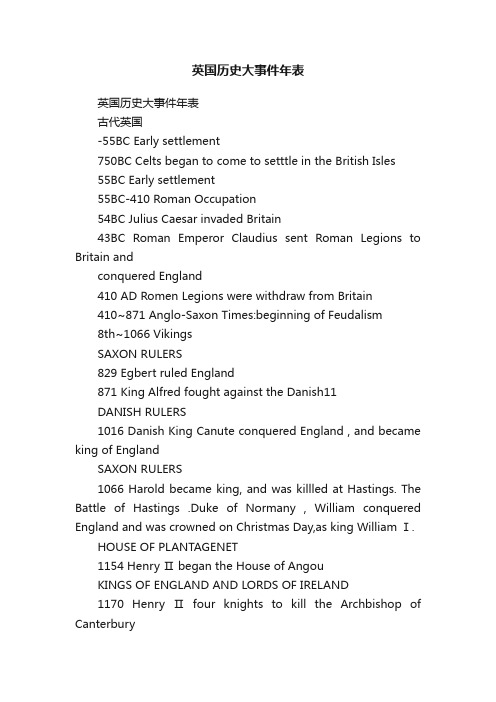
英国历史大事件年表英国历史大事件年表古代英国-55BC Early settlement750BC Celts began to come to setttle in the British Isles55BC Early settlement55BC-410 Roman Occupation54BC Julius Caesar invaded Britain43BC Roman Emperor Claudius sent Roman Legions to Britain andconquered England410 AD Romen Legions were withdraw from Britain410~871 Anglo-Saxon Times:beginning of Feudalism8th~1066 VikingsSAXON RULERS829 Egbert ruled England871 King Alfred fought against the Danish11DANISH RULERS1016 Danish King Canute conquered England , and became king of EnglandSAXON RULERS1066 Harold became king, and was killled at Hastings. The Battle of Hastings .Duke of Normany , William conquered England and was crowned on Christmas Day,as king William Ⅰ.HOUSE OF PLANTAGENET1154 Henry Ⅱ began the House of AngouKINGS OF ENGLAND AND LORDS OF IRELAND1170 Henry Ⅱ four knights to kill the Archbishop of CanterburyThomas Becket1198 Richard Ⅰ.joined the third crursa de1215 King John signed the Magna Carte1265 Simon de Montfort summoned the first parliament1282 Edward Ⅰconquered Wales1295 Edward Ⅰsummoned “Model Parliament”1296 Edward Ⅰ invaded Scotland1337~1453 The Hundred Years’war 1348 The Black Death struck England 1381 Wat Tyler UprisingHOUSE OF LANCASTER1399 Henry Ⅳ began the House of Lancaster1455-1485 the wars of the RosesHOUSE OF YORK1461 Edward Ⅳ began the house of York近代英国HOUSE OF TUDOR1485 Henry Ⅶ began the house of Tudor1509 Henry Ⅶ came to t he throne1516 Thomas More published Utopia1534 Henry Ⅷ passed the “Act of Supremacy”KINGS(QUEENS) OF ENDLAND AND IRELAND1558 Elizabeth Ⅰwas crowned1587 Elizabeth Ⅰ ordered Mary Queen of Scots to sentenced to death1588 England defeated Spain’s Armada1600 The East India Company was set upKINGS(QUEENS) OF ENGLAND ,SCOTLAND AND IRELAND HOUSE OF STAUART1603 James Ⅰbegan the house of stuart 1629 Charles agreed to sign the Petition of Right 1642 King Charles sent soldiers toarrest the Parliament leaders andPoints” the League of nation.Britain divided with France the control over German-held territory i n Aferica and the Near East 1924 Ramsay Macponald led the first Labour Party governmentKINGS(QUEENS)OF UNITED KINGDOM OF GREATBRITAIN ANDNORTHERN IRELAND1929 NY stock Market crashed, beginning the Great Depression1932 Britain enacted protective tariffs and ceased payment on wardebts to US1935 Baldwin replaced MacDonald as Prime Minister1936 George VI came to throne, social problems faded with the emergence of Nazism1937 Baldwin resigened to be succeeded as rime Minister by NeilleChamberlain1939 On September 3th Chamberlain broadcast to the nation thatBritain was in the Second World War1940 Winston Churchil formed a coalition government1941 the pearl Habor Event-us joined withBritain against JapanGerman troops weakened after failure in invading Russia-The Battle of Stalingrad1944 The Allied Forces landed in Normandy1945 In the end of the Second World War, Germany and Japansubsequently surrender.1947 India and Pakistan gain independence from Britain.1949 NATO,the North Atlantic Treaty Organization ,was estiblished.And Brit in had declined to attend the Council of Europe.1950:The Korean War broke out.Elizabeth ‖1952 Princess Elizabeth was crowned Queen Elizabeth‖.A four-day London “smog” raised the city’s death toll to threetimes its normal.1955 London passed its Clean Air Act.Wartime hero Winston Churchill in ill health resigned.1956 The Suez Crisis broke out.1957 Treaty of Rome established the European Econormic Community.1967 Britain was forced to devalue the pound in an attempt to checkinflation and improve the trade deficit.1973 Britain became a full member of the European Community whichwas still called the Common Market.And joined the European Union Britain witnessed the first oil shock.1979 Margaret Thatcher became the Prime Minister.1981 Prince Charles married lady Diana Spencer.1984 Mrs. Thatcher visited China.1990 John Major took over thereigns of the Conserative Party as PrimeMinister.1993 Britain ratified the Maastricht Treaty.1995 Major resigned as party leader in June.1997 Diana Princess died in an autommobtle accident in Paris. HK was returned to Chinese sovereignty. Tony Blair became Prime Minister.2001 Tony Blair was re-elected Prime Minister on June 8.2003 Blair , with George Bush, led a coalition of military forces in anattack on Iraq in March.2005 Tony Blair won his third term as Prime Minister .2006 An alleged airplane bomb plot threw whole Britain in chaos .2007 There was a clash between UK and Iran .Naval forces of Iran’s . Revolutionary Cruards captured 15 Britain sailors. Tony Blair stepped down from office on June 27. Gordon Bro wn became Britain Prime Minister.关键名词及解释1. LondonLondon is the largest city located in the south of the country. It is dominant in all sorts of ways. It is the cultural and business center and the headquarters of the vast majority of Britain’s big comp anies. It is not only the financial center of the nation, but also one of the three major internation al financial centers in the world. 2. Robin HoodRobin Hood was a Saxon nobleman. As he could no longer put up with oppressions from the Nor mans, he became an outlaw and hid himself with his band of “merry men” in the forest. From thi s secret place, he went out to rob from the rich to give the poor. 3. Anglo-SaxonsThey were two groups of Germanic peoples who settleddown in England from the 5th century. T hey were regarded as the ancestors of the English and the founders of England. 4. King ArthurIt is said that he was the King of England in the 5th century and united the British and drove the S axons back with his magical sword, Excalibur. His real existence is in doubt. He is the central figure of many legends. 5. King HaroldHe was the Saxon King whose army was defeated in the Battle of Hastings in 1066, when William the Conqueror invaded England from France. 6. The Bill of Rights of 1689In 1688, King James II’s daughter Mary and her husband William were invited by the politicians a nd church authorities to take the throne, on condition that they would respect the rights of Parlia ment, The Bill of Rights was passed in 1689 to ensure the King would never be able to ignore Parli ament. 7. The ConstitutionBritain has no written Constitution. The foundations of the British state are laid out in statute law, which are laws passed by Parliament; the common laws, which are laws established through com mon practice in the courts; and conventions. 8. The functions of ParliamentThe functions of Parliament are: to pass laws, to vote for taxation, to scrutinize government policy , administration and expenditure and to debate the major issues of the day. 9. The House of LordsThe House of Lords consists of the Lords Spiritual, who are the Archbishops and most prominent bishops of the Church of England; and the Lords Temporal, which refers to those lords who either have inherited the seat from their forefathers or they have been appointed. The lords mainly rep resent themselves insteadof the interests of the public. 10. The House of Commons The House of Commons is the real center of British political life because it is the place where abo ut 650 elected represent the interests of the people who vote for them. 10. The importance of ge neral electionsGeneral elections are very important in western democracy. According to the author, they provid e opportunities for people to influence future government policies and to replace those incompet ent political leaders.11. The formation of the government651 members of parliament are elected in the general election representing 651 constituencies in the UK. The party which holds a majority of those “seats” in parliament forms the government, with its party leader as the Prime Minister. 12. The electoral campaignsBefore a general election, the political parties would start their electoral campaigns in order to m ake their ideologies and policies known to the public, The campaign involves advertisements in n ewspapers, door-to-door campaigning, postal deliveries of leaflets and “party electoral broadcast s” on the television. The parties also try to attack and criticize the opponents’ policies, Therefore, these campaigns sometimes can be quite aggressive and critical. 13. Ethnic relations in the UK The coming of immigrants groups from other parts of the world has greatly enriched British cultu re. But ethnic relations are also sometimes tense: the local people view the newcomers as a thre at to their way of living; and despite much official actions to minimize racism, both subtle and ove rt oppression remains. The immigrant population is not well-off economically. They face problem s of unemployment, under-representation in politicsand unfair treatment by police and by the ju stice system.14. Comprehensive schoolsComprehensive schools are the most popular secondary schools in Britain today. Such schools ad mit children without reference to their academic abilities and provide a general education. Pupils can study everything from academic subjects like literature to more practical subjects like cooking .15. Grammar schoolsIt is a type of secondary schools in Britain. Grammar schools select children at the age 11, throug h an examination called “the 11-plus”. Those children with the highest mar ks go to grammar scho ols. These schools lay emphasis on advanced academic subjects rather than the more general cur riculum of the comprehensive schools and expect many of their pupils to go on to universities. 16 . Independent schoolsIndependent schools are commonly called public schools which are actually private schools that r eceive their funding through the private sector and tuition rates, with some government assistan ce. Independent schools are not part of national education system, but the quality of instruction and standards are maintained through visits from Her Majesty’s Inspectors of Schools. These scho ols are restricted to the students whose parents are comparatively rich. 17. The Open University The Open University was founded in Britain in the1960’s for people who might not get the opport unity for higher education for economic and social reasons. It’s open to everybody and does not demand the same formal educational qualifications as the other universities. University courses a re followed through TV, radio, correspondence, videos and a net work of study centers. At the end of their studies at the Open University, successful students are awarded a university degree.18. “Football hooligans”“Football hooligans” reflect the violence associ ated with football. While all social classes used to join in the local football match, it was regarded as being not at all suitable for gentlemen. Visitors from abroad sometimes complained about stumbling into the midst of a rough and dangerous ga me when walking the streets of London, while local householders and merchants were troubledby having their windows broken by stray footballs. Drinking hard went along with playing hard. To day, violence is still associated with football. “Football hooligans” are supporters of rival teams. T hey sometimes clash before, during and after matches and occasionally run riot through the town , breaking windows and beating each other up. 19. Cricket and “fair play”Cricket was one of the very first team sports in Britain to have organized rules and to be played ac cording to the same rules nationally. The reason that fixed rules were applied to cricket so early o n was a financial one: aristocrats loved betting on cricket matches and if people were going to ric k money on a game, they wanted to ensure that the game would be played fairly. In Britain peopl e from all walks of life play cricket, but in the 19th century, cricket was a sport played mainly by t he upper classes. It was a kind of “snob” game played by boys who at tended public schools. As ge nerations of public school boys grew up to become the civil servants and rulers of the UK and its c olonies, cricket became associated with a set of moral values, in particular the idea of “fair play”which supposedly characteri zed Britishgovernment. 20. WimbledonWimbledon is the name of a London suburb. In Wimbledon the world’ best players gather to com pete on grass courts. It is one of the major events of the British sporting calendar and probably th e most famous tennis event in the world. Besides actually watching the tennis matches, other acti vities closely associated with the “Wimbledon fortnight” are eating strawberries and cream, drink ing champagne and hoping that it doesn’t rain. 21. The three traditions of Christmas in Britain There are three Christmas traditions which are particularly British: one is the Christmas Pantomi me, a comical musical play. The main male character is played by a young woman while The main female character, often an ugly woman called “the Dame”, is played by a man. Another British Ch ristmas tradition is to hear the Queen give her Christmas message to her realm over the televisio n and radio. A third British tradition is Boxing Day, which falls on the day after Christmas. Traditionally, it was on Boxing Day that people gave Christmas gifts or money to their staff or servants. N ow that most British people do not have servants, this custom is no longer observed. However, a new Boxing Day custom has emerged, in the cities: shopping. Shops open up to sell off all their Ch ristmas stock decorations, food, cards and gift items at low prices. 22. Orange Marches These events can be traced back to the 17th century battles between Catholics and Protestants. Now the Protestants celebrate their victory at the Battle of the Boyne (12 July) in 1690. The Cath olic King James II was forced off the throne in 1688. William of Orange was invited to take the thr one and James was driven into exile. The Twelfth of July is the high point of what is known as the Mar ching Season, when Protestant “Orangemen”take to the streets wearing their traditional unif orms and orange sashes, marching through the streets singing, banging drums and playing in mar ching bands. The Orangemen often clash—verbally, legally or sometimes violently—with the Cath olics as they attempt to parade through Catholic neighborhoods. Therefore, during Orange March es there is a massive police and army presence surrounding the parades and the atmosphere can be very tense. 23. EisteddfodWales has a long poetic tradition. Poems written in the traditional Welsh language and style are g overned by ancient codes and conventions. This poetic tradition has been celebrated for centurie s.英国历史重大事件年表约公元前3000年,伊比利亚人进入不列颠,以长坟闻名约公元前2000年,建立巨石阵;宽口陶器人出现,以钟形容器闻名约公元前700年,三波凯尔特人进入不列颠:盖尔人、布立吞人、贝尔格人公元前55年,Julius Caesar率罗马军团入侵不列颠,开启不列颠有文字记载的历史公元43年Claudius皇帝时期,罗马正式占领不列颠,不列颠的罗马时代持续400年597年,教皇格里高利一世派St. Augustine到不列颠传教9世纪,Egbert成为第一位英格兰国王1066年诺曼征服:忏悔者爱德华、哈罗德、征服者威廉;斯坦福桥、黑斯廷斯战役;封建制度完全建立。
英国历史重大历史事件有哪些

英国历史重大历史事件有哪些英国全称为大不列颠及北爱尔兰联合王国,由英格兰、威尔士、苏格兰和北爱尔兰组成,那么英国有哪些重要的历史事件呢?下面店铺分享了英国历史重大历史事件,一起来看看吧。
英国历史重大历史事件英国重大历史事件1、《大宪章》(Magna Carta/Great Chart)于1215年由约翰王 (King John)签署。
其主要内容是保护贵族权利,免受国王的侵犯。
其主要精神是限制王权。
积极意义在于,它保障城市市民的若干权利,初次把市民阶层作为一种必须考虑的政治力量。
这一事件体现了封建贵族与国王的斗争。
英国重大历史事件2、英法百年战争(The Hundred Years'' War)14四世纪时,法国尚未统一。
英国在法国占有一些领地。
英国为了进一步扩张在大陆上的土地,抢夺当时重要的羊毛加工业发达的重要城市佛兰得尔,借口继承法国王位,掀起了从1337年至1453年的“英法百年战争”。
战争带来的沉重租税,频繁兵役和高涨的物价使民众不满情绪达到极点。
最后英军失败,欧洲大陆上领土丧失,封建主和商人也遭受损失,严重地削弱了英国的封建统治。
英国重大历史事件3、黑死病(Black Death)1348年,横扫欧洲的黑死病(一种鼠疫),几乎夺去了英国人口的一半,导致劳动力缺乏,粮价上涨,但国王爱德华三世却于1394年颁布敕令,规定工人仍按黑死病前的工资受雇。
1351年,议会又制订《劳工法案》,规定对破坏雇佣法令者戴枷下狱,阶级关系日益尖锐。
英国重大历史事件4、宗教改革(The Reformation)14世纪英国城乡矛盾激化,出现了改革教会运动。
牛津大学神学院教授约翰·威克利夫(John Wycliffe) 及其他一些教士提出了符合下层人民要求的改革教会的主张,如反对教会征收捐税、否认教士特殊地位、消灭封建贵族等,为泰勒起义作了思想准备。
英国重大历史事件5、泰勒起义(Tyler''s Revolt)1381年5月,为反对增加税收,英国东南部发生了以泥瓦匠瓦特.泰勒(Wat Tyler) 为领袖的农民起义。
中英对照英国历史5
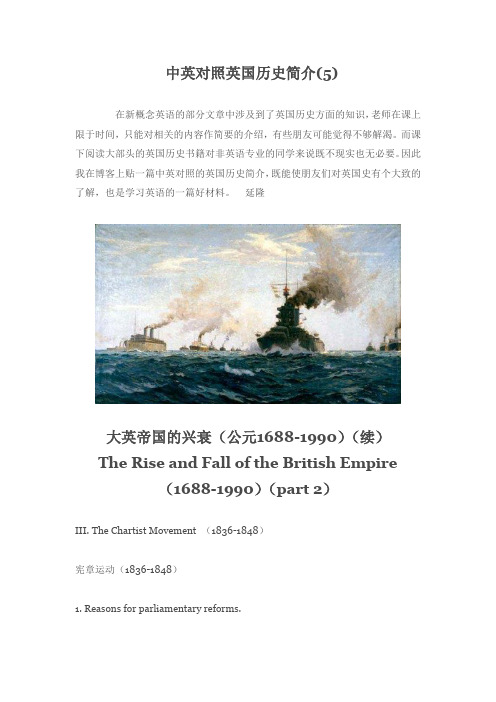
中英对照英国历史简介(5)在新概念英语的部分文章中涉及到了英国历史方面的知识,老师在课上限于时间,只能对相关的内容作简要的介绍,有些朋友可能觉得不够解渴。
而课下阅读大部头的英国历史书籍对非英语专业的同学来说既不现实也无必要。
因此我在博客上贴一篇中英对照的英国历史简介,既能使朋友们对英国史有个大致的了解,也是学习英语的一篇好材料。
延隆大英帝国的兴衰(公元1688-1990)(续)The Rise and Fall of the British Empire(1688-1990)(part 2)III. The Chartist Movement (1836-1848)宪章运动(1836-1848)1. Reasons for parliamentary reforms.议会改革的原因(1)Power was monopolized by the aristocrats.权力由贵族操纵。
(2)Representation of town and country,and North and South was unfair.城镇和农村,北方和南方的代表权极不平等。
(3)There were also various so-called rotten or pocket boroughs.还有各种称之为衰败或口袋选区的选区。
2.Three Reform Bills三个改革法案Between 1832 and 1884 three Reform Bills were passed.1832年至1884年间通过了三个改革法案。
a)The Reform Act of 1832 (also called the “Greater Charter of 1832)abolished ”rotten boroughs“,and redistributed parliamentary seats more fairly among the growing tows. It also gave the vote to many householders and tenant…s,based on the value of their property.1832年的《改革法案》(也称为1832年的大宪章)废除了“衰败选区”;在新兴城镇中较为公平地重新分配了议席;以财产价值为基础给予许多屋主和佃家。
- 1、下载文档前请自行甄别文档内容的完整性,平台不提供额外的编辑、内容补充、找答案等附加服务。
- 2、"仅部分预览"的文档,不可在线预览部分如存在完整性等问题,可反馈申请退款(可完整预览的文档不适用该条件!)。
- 3、如文档侵犯您的权益,请联系客服反馈,我们会尽快为您处理(人工客服工作时间:9:00-18:30)。
●Norman Conquest诺曼征服
●Hundred Years’War百年之战
●War of Roses玫瑰战争
●Black Death黑死病
●Puritans清教徒
●Westminster model威斯敏特模式
●Great Charter大宪章
●English Renaissance文艺复兴
●Norman Conquest诺曼征服 King Edward had promised the English throne to
William,the Duke of Normandy, but the Witan chose Harold as king. So William led his army to invade England In October 1066, in the important battle of Hastings, William defeated Harold and killed him. thus William was crowned king of England and established a strong Norman government and the feudal system in England, thus beginning the Norman Conquest of England.
●Hundred Years’ War百年之战: It referred to the intermittent war between France
and England that last from 1337 to 1453. The causes were partly territorial and partly economic. When Edward III claimed the French Crown but the French refused to recognize, the war broke out. At first the English were successful, but in the end, they were defeated and lost almost all their possessions in France.
The expelling of the English was a blessing for both countries.
●War of Roses玫瑰战争 :They referred to the battles between the House of
Lancaster and the House of York between 1455 and 1485. The former was symbolized by the red rose, and the latter by the white one. After the wars, feudalism received its death blow and the king’s power became supreme and the great medieval nobility was much weakened. Tudor monarchs ruled England and Wales for over two hundred years.
●Black Death黑死病:It is a modern name given to the dearly bubonic plague, an
disease spread through Europe in the fourteenth century . It came without warning, and without any cue. In England, it killed almost half of the total population, causing far-reaching economic consequences.
●Puritans清教徒:The Puritans were wealthy, well-educated gentlemen. They wanted
to purify the Church of England and threatened with religious persecution, the Puritans leaders saw the New world as the a refuge provided by God for those He meant to save.
●Westminster model威斯敏特模式:the City of Westminster is England's political
center of power,so the the Britain system of parliamentary government is called Westminster model.//in this system,the legislature elects the country's chief executive,called prime minister,from the ranks of the majority party in the parliament,the prime minister then selects cabinet ministers from the
parliament.the parliamentary majority controls the government
●Great Charter大宪章:King John’s reign caused much discontent among the barons.
In 1215, he was forced to sign a document, known as Mangna Cara, or the Great Charter. It has 63 clauses. Though it has long been regarded as the foundation
of English liberties, its spirit was the limitation of the king’s powers, keeping them within the bounds of the feudal law of the land.
English Renaissance文艺复兴: Renaissance was the revival of classical literature and artistic styles in European history. It began in Italy in the early 14th century and spread to England in the late 15th century.The English Renaissance had 5 characteristics: (1) English culture was revitalized not so much directly by the classics than other European countries; (2) England followed a course of social and political history which was large independent on European history; (3) Owning to the great genius of the 14th century poet Chaucer, the native literature was vigorous enough and experienced foreign influences without being subjected by them; (4) English Renaissance literature is chiefly in artistic, rather than in philosophy and academy; (5) the
Renaissance coincided with the Reformation in England. Its finest exponents were Christopher Marlowe, Ben Jonson, and William Shakespeare. (1)英国文化的复兴,不全是直接受古典文化的影响,而更多的是受当时有文艺复兴思想的欧洲人的影响;(2)作为岛国,英国的社会和政治历史进程在很大程度上独立于欧洲其他国的历史进程;(3)由于14世纪产生了伟大天才诗人乔叟,英国本土文学相当有生气,善于融合外来影响而未被同化;(4)英国文艺复兴时的文学主要是艺术的,而非哲学及学术的;(5)文艺复兴与英国宗教改革同时发生。
最出名代表人物是克里斯托夫·马洛、本·琼生和威廉·莎士比亚。
